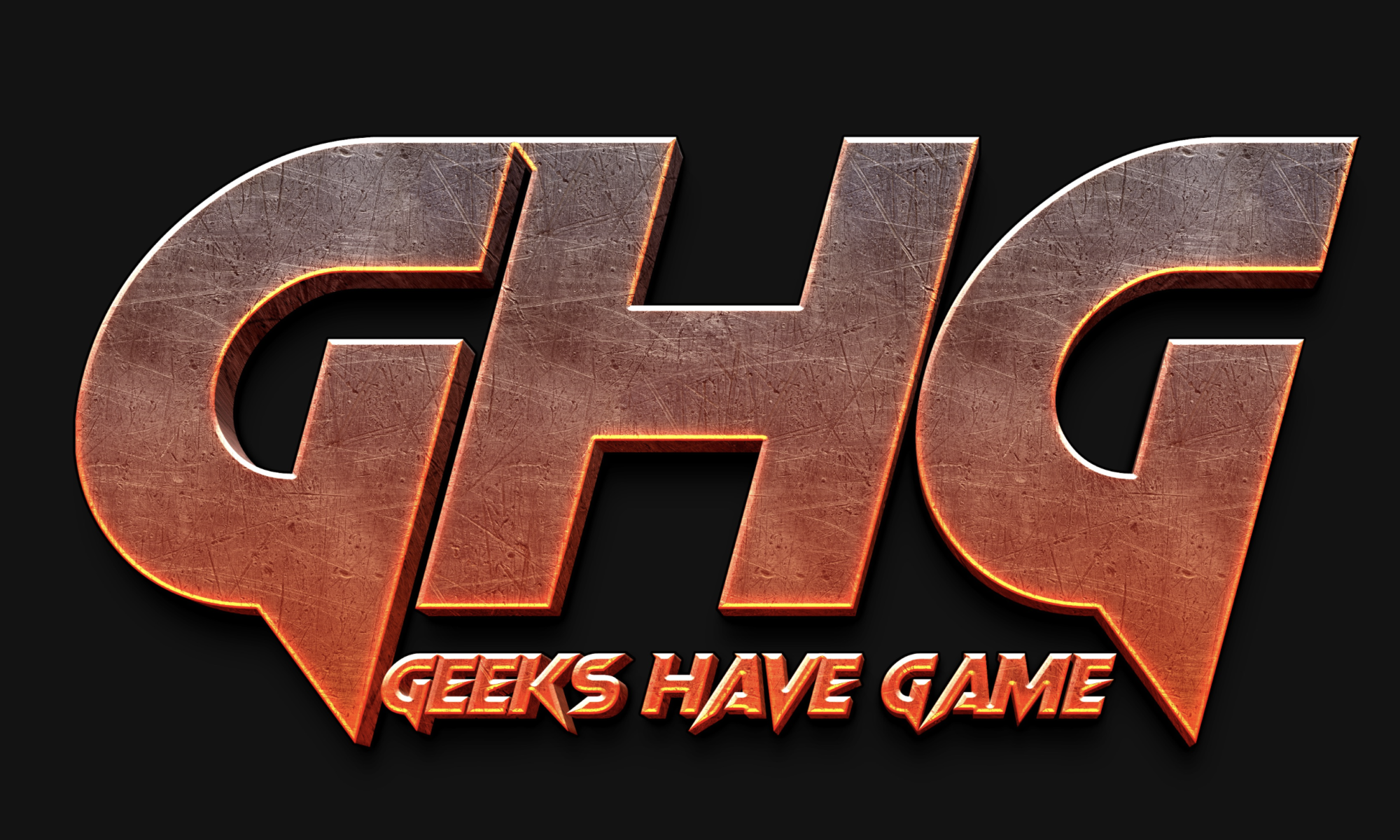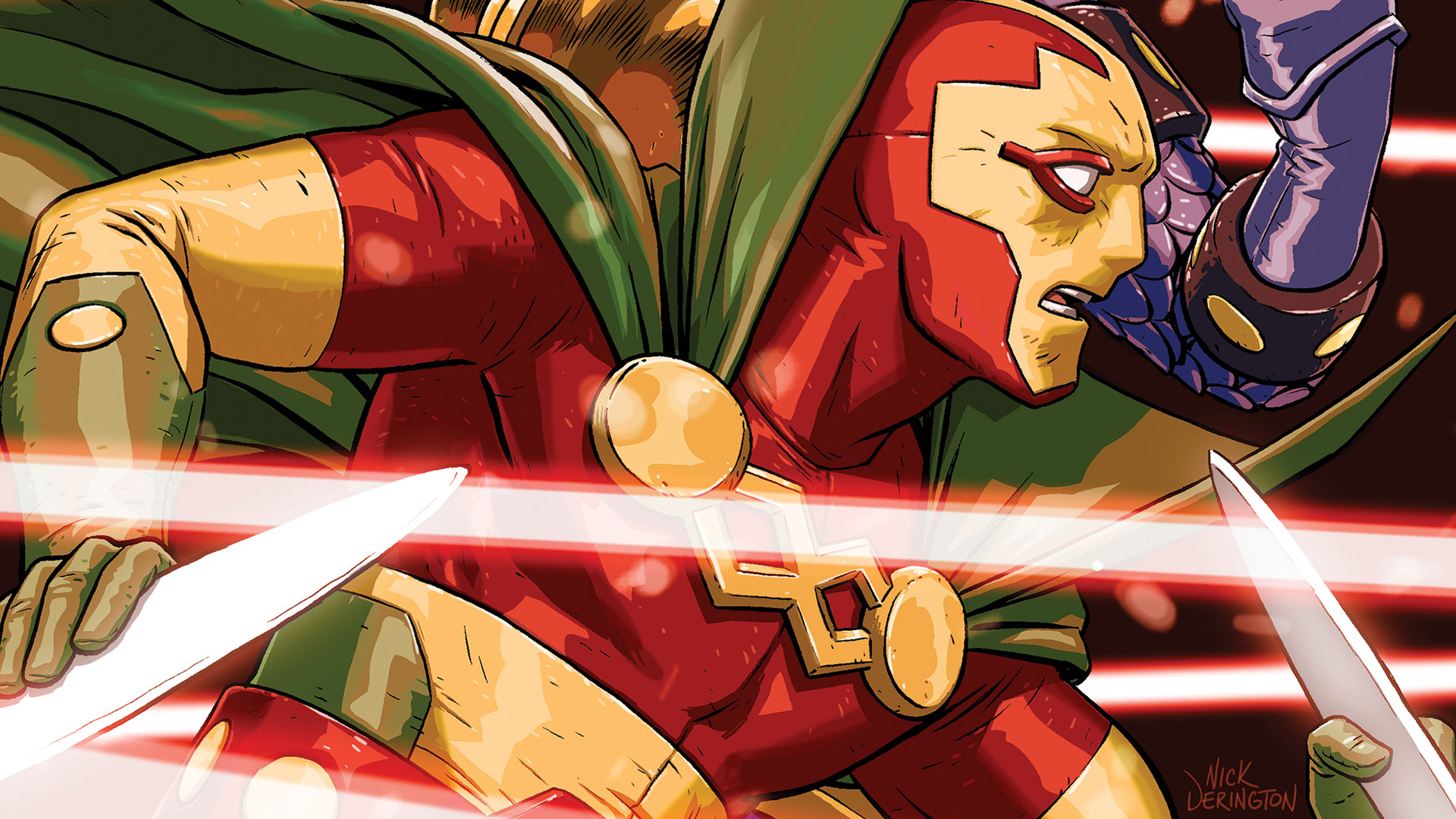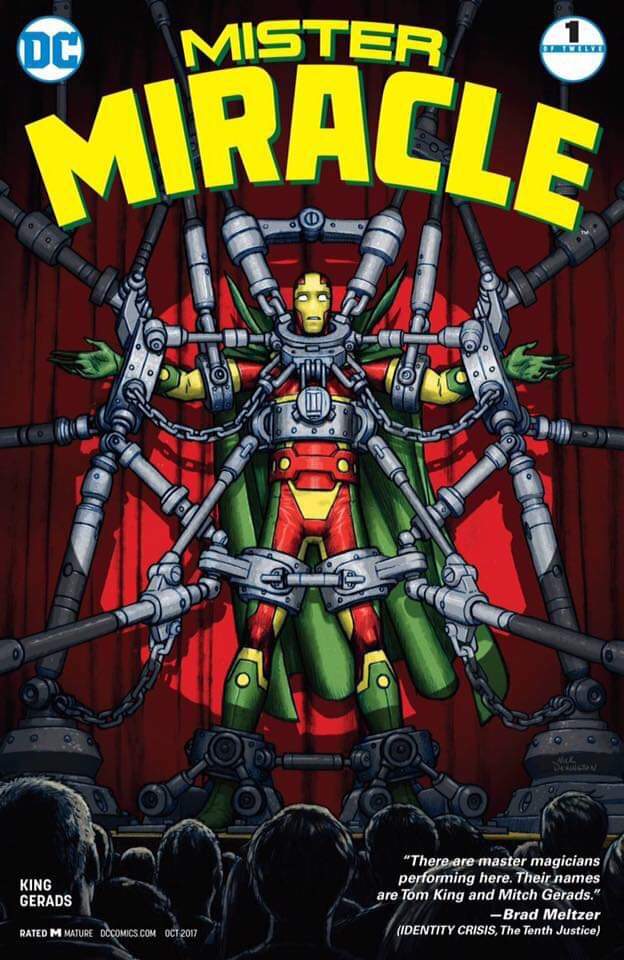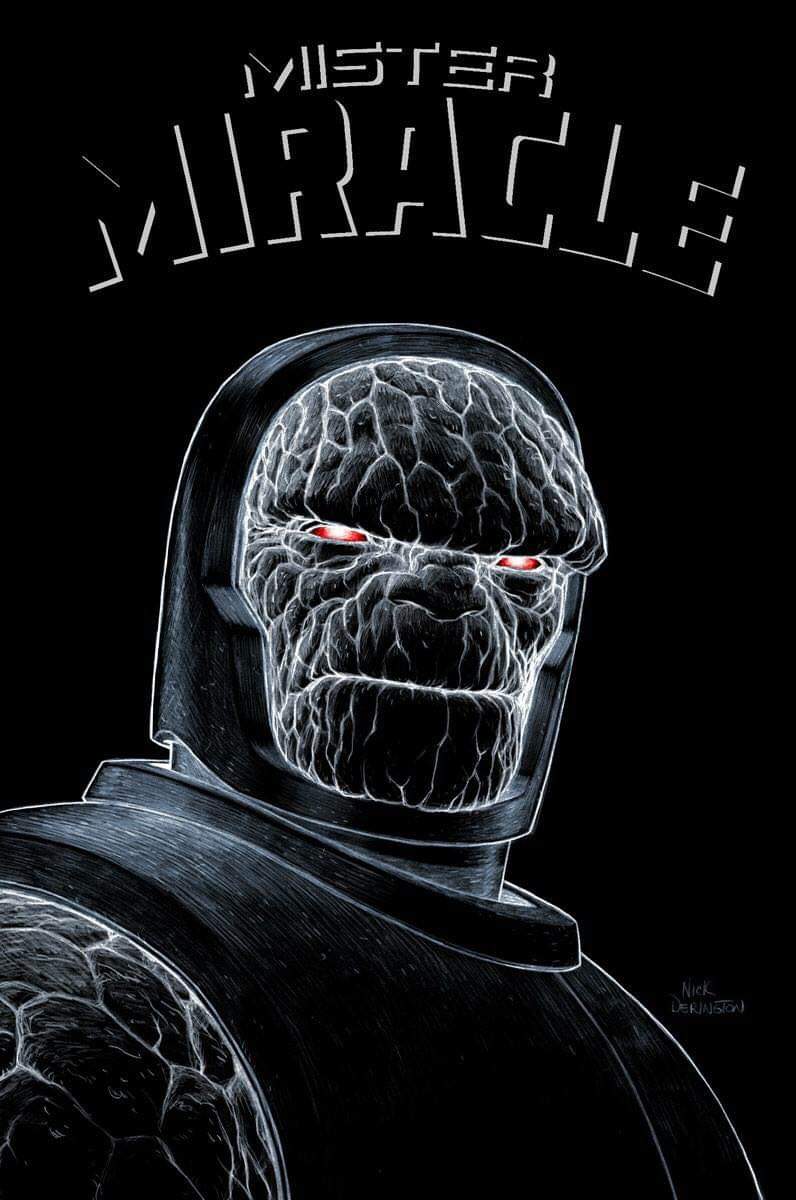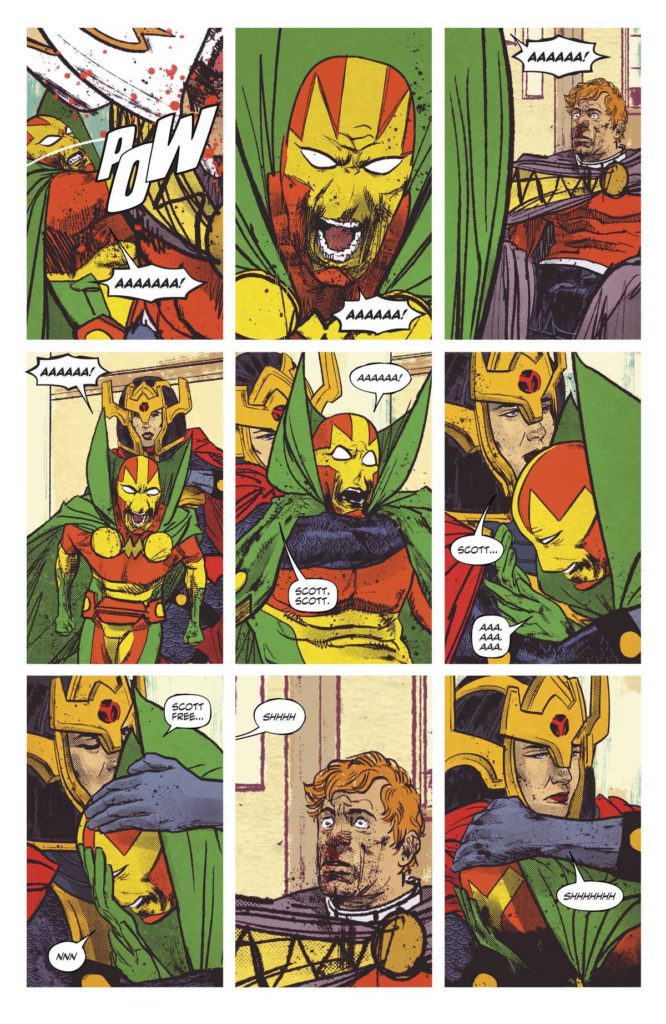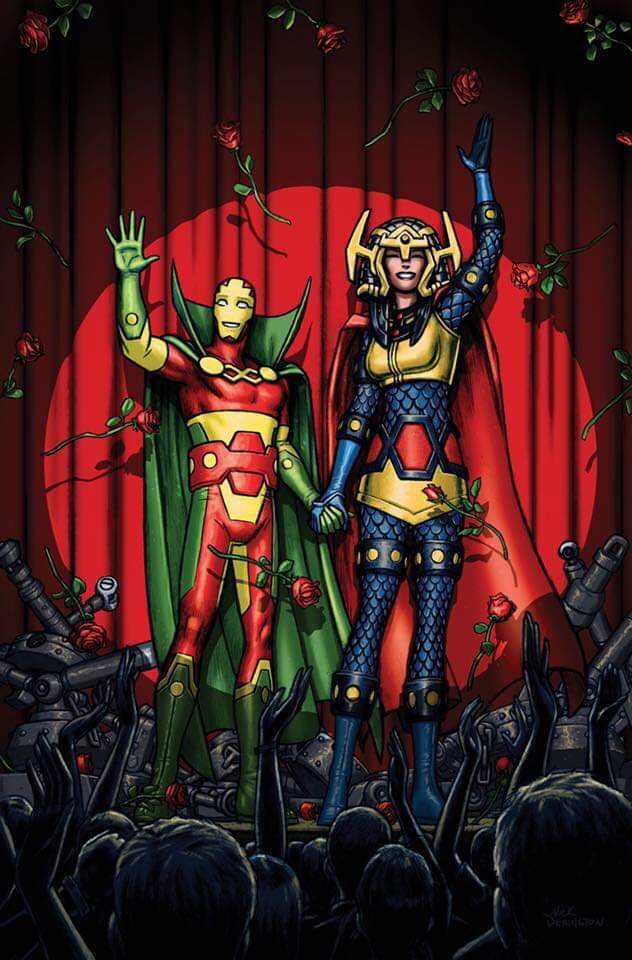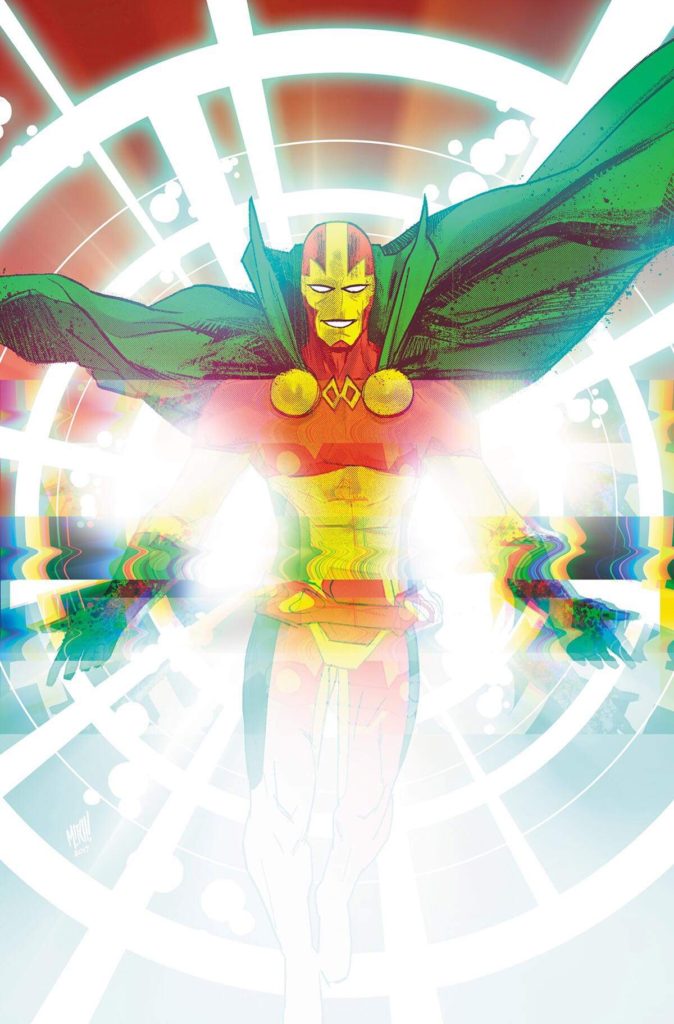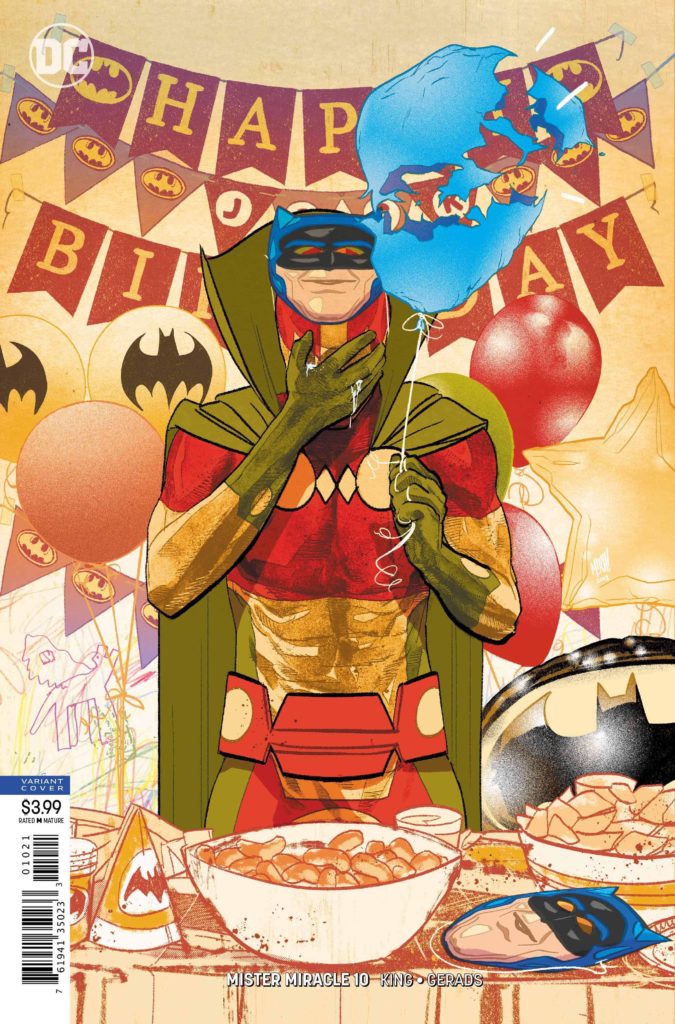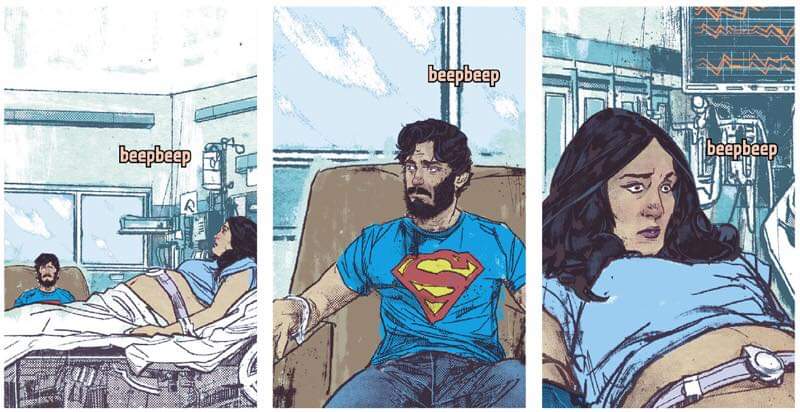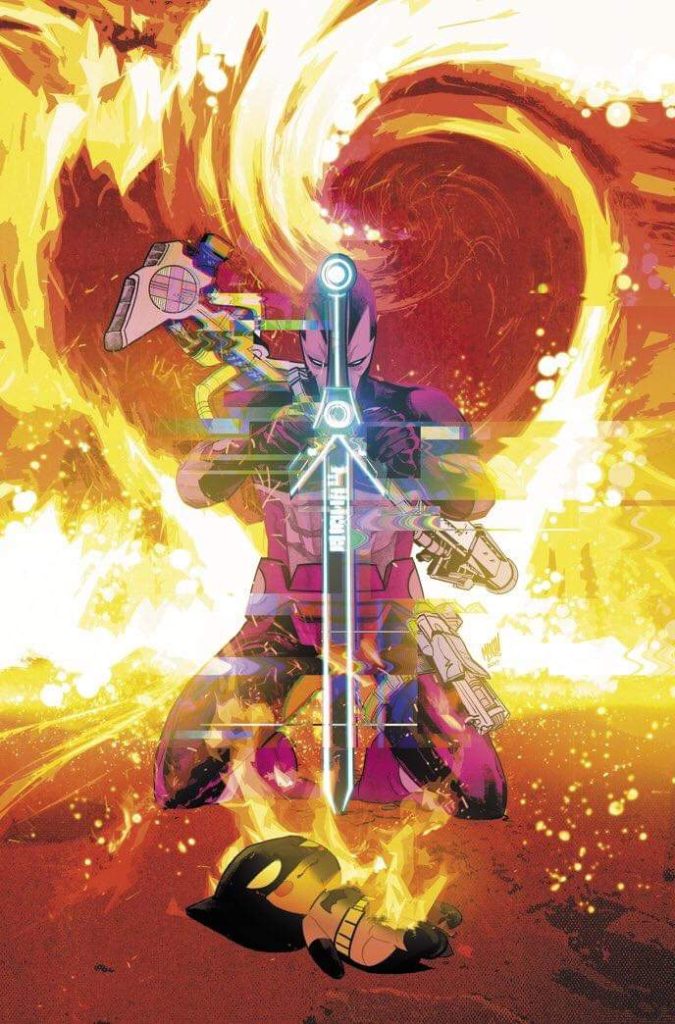“If a mastermind couldn’t trap Mister Miracle, you’d think it’s well-nigh impossible! See how it’s done next issue!”
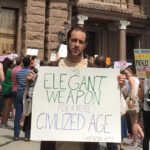
What is the ultimate trap that Scott Free must escape? The first answer that Tom King and Mitch Gerads explicitly provide readers in the first issue of their award-winning MISTER MIRACLE is the one trap that awaits us all: Death. Can the greatest escape artist of all actually die and come back? But there’s immediately a duality at play. Isn’t that question just the stage version of the suicide attempt our hero makes right before the series begins? The story for G. Gordon Godfrey’s live studio audience? Wasn’t Scott actually crushed by the mounting depression of his entire life, going all the way back to when he was a child and traded to his father’s greatest enemy as part of The Pact to end the war between New Genesis and Apokolips, and Oberon’s off-panel death was just what finally tipped him over into actually opening up his wrists? So, then it becomes a scenario where Scott was trying to escape his life/depression via suicide, only he failed.
As the series progresses, this duality persists between the real-life emotional-damage standpoint and a more cosmic Kirby perspective: 1) can Scott overcome his depression and keep functioning/not attempt another life-escape amidst the horrifying and rapidly escalating stakes of Total GodWar + Sudden Parenthood? opposite 2) the reader’s growing unease and disturbance over what’s the deal with the way the panels keep glitching, leading us to question the reality of what we’re being shown. Did Scott actually die at the beginning of the series and we’re rocking an afterlife Jacob’s-Ladder type scenario (a name that, by the way, just happens to synchronize perfectly with the name Kirby’s father gave him when he was born)? That tension remains in play for the majority of the series.
But then there’s a turn near the end when we get the idea that Scott was exposed to the Anti-Life Equation, which actually functions as a continuation/explanation of the Jacob’s-Ladder option. Scott died or is still back on Pages Two and Three of #1 bleeding out on his condo’s bathroom floor and this whole insane run has been either Hell or some dream scenario his final neurons have fired up for him in the titanic tradition of Ambrose Bierce’s “An Occurrence at Owl Bridge.” It’s also worth noting that the 3×3 nine-panel grid might in this case not be as much a WATCHMEN fixation as a deliberate layout choice intended to resemble the bars of a cage, this trap that Scott has built for himself.
Gerads only breaks that grid four times in the series: the aforementioned double-page splash of Scott with slashed wrists on the bathroom floor (the only objective “real-world” image the reader is provided), a splash also in #1 of Scott as a kid during the drawing-the-face-of-God bit, when Metron shows Scott and Barda current “real-world” DC continuity at the end of #11, and then the redux of kid Scott in #12. After Metron makes his surprise return there in #11, the set-up for the finale very much seems to be the confirmation that this entire series has taken place with Scott trapped in some narrative pocket of the Anti-Life Equation and for the big finish next issue, he’s going to have to escape back to regular continuity. Or as regular as mainstream superhero continuity ever gets. That’s why the conclusion is so jarring to the reader.
In #12, the previous issue’s revelation seems to be washed away. It’s just another morning. Barda wakes up and Scott is taking a shower, smiling and happily wishing her a good morning. There’s a tense moment when he picks up a razor, but then he just uses it to shave off his beard. A glitchy Forager appears to unambiguously summarize the broad strokes of the series while Barda’s fighting Kanto. Forager concludes very definitively with the idea that they’re all in Hell and Scott could have escaped last issue with Metron but chose not to. Cut to the ultrasound, a transition reinforcing both the mundanity and miraculousness of everyday life as Scott and Barda find out they’re going to have a baby daughter. Then, Orion inverts the scenario the next page by suggesting that Scott’s in Heaven (which, being the son of Darkseid, is naturally his own version of Hell) while reiterating Forager’s summary of events: Scott killed himself, is in the afterlife, and has decided to stay trapped in his own perfect world.
(And there’s so much happening in #12 that I only just now realized that Jacob is trying to say “Excelsior!” to Uncle Funky, God)
Highfather provides additional corroboration. Scott did indeed face the Anti-Life Equation. “It warped your world,” is the ever-present glitch. But when he patronizes Scott, says that he understands his son’s failure, Scott decks him. Because he hasn’t failed. He’s succeeded. Almost at the very end now, when Scott finds himself in a moment of doubt/weakness/duality-stasis (“I think I did everything wrong. I should’ve escaped. I shouldn’t have escaped.”), his ultimate father-figure Oberon/Kirby appears to give him a hug and reinforce that Scott has made the right decision, referencing the double-page splash of Rebirth continuity that Metron showed at the end of #11, a necessary piece of acknowledgment provided here due to the fact that Scott seems to have done his best to mentally cut narrative ties with how we ended up last issue. And Oberon/Kirby’s validation is what Scott needs to keep going.
He hasn’t escaped Death. He hasn’t escaped the Anti-Life Equation. He’s used both as ammunition to escape Life. Life as defined by the never-ending reboot horror of actually trying to experience functional linear consciousness in the DC Universe. “All those crises and continuities that never really make sense.” A life of monthly publication overseen by DC Editorial is the trap that Scott has escaped. He is the face of God, that little boy drawing a picture, defining his existence on his own terms, a fourth world– “my world, the world I see when I close my eyes.” He has escaped the trap of the original terms of his creation by using the Anti-Life Equation to create a trap of his own design, a nine-panel jail-cell grid that we’re all in, our “normal” lives full of having to go to work and making sure the baby gets a nap and sitting on the couch with our partners, apologizing because the remote’s busted and we forgot to get a new one because the day was so crazy.
“What is wrong with you?” Barda asks her husband on the last page. “I can always escape,” he says. That’s more than a catchphrase. It’s the answer to her question. It’s Scott’s weakness; it’s his flaw. He can always decide to bail, cut and run, drop back in on whatever’s happening in mainstream DC continuity. HEROES IN CRISIS, I guess. But then Barda punches a hole in the super-gravity of that answer with a follow-up question and a kiss, a simple gesture thematically reminiscent of the wink Alan Moore gave Kal-El for the last panel of a different imaginary last story over thirty years ago. Because with that last glitch finally landing on the happy couple, we are given the best ending to Scott Free’s story we’re ever going to get: “And he never escaped and lived happily ever after amidst the blissful domestic madness of raising a family with someone he loves.” Stories don’t have to be linear. He and Barda can actually show up in HEROES IN CRISIS next month, and that’s fine and doesn’t have to negate all of this in the slightest.
Somewhere way down the line, this is how it all ends for Scott Free of New Genesis and Apokolips and Los Angeles. He slashes his wrists in his bathroom and escapes the DC Universe. He escapes the monthly grind of being forever blasted out onto the stands in a new #1 and put through his paces by men and women who, for all their good intentions and exceptional ability, will never be able to approach the staggering heights of impossible imagination and daunting dynamism that forged him in the cradle and cauldron of Kirby’s imagination. He escapes his Life by building and becoming a new God of his own Anti-Life, which looks a lot like yours and mine. And he stays there until he grows old and dies because it’s the best place for him, the happiest place in all of creation. The only person who can stop Scott Free from escaping, the only one who can trap Mister Miracle, is himself. Scott Free is.
-Rob Bass
